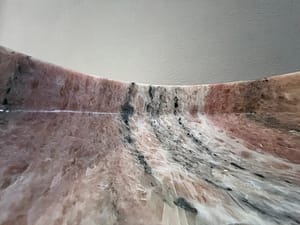Marble has long been revered as a symbol of luxury, endurance and sophistication. From elegant countertops to intricate sculptures, marble is a key investment in countless homes and architectural masterpieces worldwide. However, despite its durability, marble is not impervious to damage. Surprisingly, both soft and hard water can pose significant threats to natural stone, albeit in different ways. In this post, we’ll look into the relationship between water hardness and marble damage.
Understanding Water Hardness
Before exploring how water affects marble, it’s crucial to understand water hardness. Water hardness refers to the concentration of dissolved minerals, primarily calcium and magnesium ions, present in water. Hard water contains high levels of these minerals, while soft water has low concentrations.
The Impact of Soft Water on Marble
Soft water, often preferred for its ability to prevent limescale buildup and produce softer-feeling skin, poses a surprising risk to marble surfaces. Unlike hard water, which provides some level of protection due to its mineral content, soft water lacks these minerals and becomes aggressive in its quest for equilibrium.
When soft water comes into contact with marble, it seeks to dissolve the calcium carbonate present in the stone. Over time, this chemical reaction can lead to etching, dullness, and structural damage. Etching appears as dull spots or marks on the marble surface, typically caused by acidic substances reacting with the calcium carbonate. Despite its gentler reputation, soft water’s propensity to dissolve minerals makes it a potential threat to the integrity of marble.

The Dangers of Hard Water
On the other end of the spectrum, hard water poses its own set of challenges for marble surfaces. While the minerals in hard water can offer some protection against etching, they contribute to limescale buildup, which can mar the appearance of marble and prove challenging to remove.
Limescale deposits form when calcium and magnesium ions precipitate out of hard water and adhere to surfaces over time. If left unchecked, limescale can accumulate on marble countertops, floors, and fixtures, detracting from their natural beauty and requiring rigorous cleaning methods to address.
Mitigating the Risks
Protecting marble from the damaging effects of both soft and hard water requires proactive measures and diligent maintenance:
- Stone Sealing: Apply a high-quality sealant to marble surfaces to create a protective barrier against water and contaminants. Regular resealing helps maintain the integrity of the seal and prolongs the life of the marble.
- pH-Neutral Marble Cleaners: Use pH-neutral or marble-specific cleaners, like MB-5 Stone & More to prevent etching and maintain the natural shine of marble surfaces. Avoid acidic cleaners that can exacerbate damage, regardless of water hardness.
- Prompt Drying: After cleaning or exposure to water, promptly dry marble surfaces to prevent water spots and minimize the risk of damage from prolonged moisture exposure.
- Water Quality Testing: Periodically test the water quality in your home to monitor mineral levels and adjust your maintenance routine accordingly. Awareness of water hardness can help you tailor your approach to marble care.
- Professional Stone Maintenance: Consider enlisting the expertise of professionals for routine maintenance and repairs. Experienced professionals can assess the condition of your marble surfaces and recommend appropriate treatments to mitigate damage and preserve their beauty.
Marble’s beauty and durability make it a prized choice for various applications, but its susceptibility to water damage underscores the importance of informed maintenance practices. Whether faced with soft or hard water, proactive care and vigilance are essential for protecting marble surfaces from etching, dullness, and limescale buildup.
By understanding the relationship between water hardness and marble damage and implementing preventive measures, you can ensure that your marble surfaces retain their natural splendor for generations to come. From countertops to flooring, treating marble with the respect it deserves ensures that its timeless elegance continues to enrich homes and spaces around the world.
If your stone surfaces in NYC, NJ & CT are worn or damaged, contact us today at (888) 400-4302 for a FREE restoration estimate. Let’s discuss how we can clean, protect and restore your stone surfaces. Your satisfaction is our top priority!
